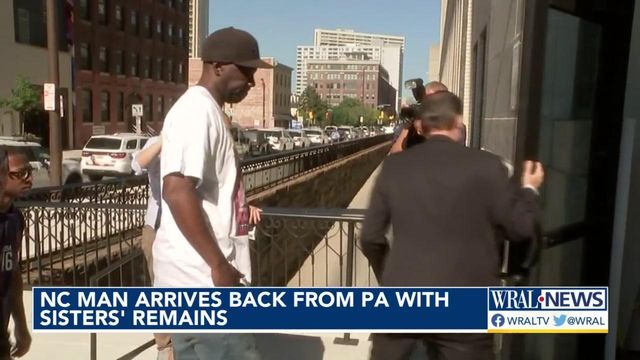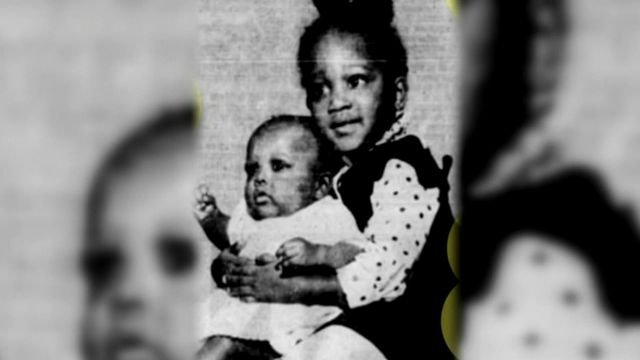'I can finally rid them of the city that helped murder them:' Remains of 2 Black girls killed in Philadelphia police bombing returned to Fayetteville
But in the decades since, some of those remains have been lost, found and now, returned to the family, who accuses the city of mishandling the bones of two young girls.
Posted — Updated"I never got to hold my sisters' hands, I never got to hear their voices," the Fayetteville resident said. "I never got to grow up with them.”
They were killed in a bombing less than 40 years ago as part of the city of Philadelphia's targeted attack on the Black Power movement.
"The city of Philadelphia took so much from me," he said.
His sisters, Katricia and Zanetta Dotson, were only 12 and 14 at the time. They were killed by a satchel bomb, which is primarily used for combat, dropped from a police helicopter over a residential neighborhood.
"I found out by way of television," Lionell Dotson said. "My Aunt told me, 'That was your sisters' that died in the bombing.' I couldn't grasp the idea at first."
The 1985 MOVE bombing, named after the organization targeted and deemed a terrorist organization by the police, killed 10 people, including five children and MOVE founder John Africa. 61 homes were destroyed and 250 people were left without homes because of the bombing.
Dotson said it's taken him nearly four decades to finally retrieve his big sisters' remains. For years, the remains were tucked away at the University of Pennsylvania Museum of Archeology and Anthropology until a staffer found them.
"This has been an ongoing tragic battle to receive my sisters' remains," Dotson said.
He said he had no idea that the city still had his sister's remains until he read an article online. Working with a lawyer, Dotson said he was able to get the remains released to him, but it took them a year.
Doston said he was at his "wits end," frustrated that the Medical Examiner's Office and the city failed to give him the remains sooner.
Even though the racially-motivated bombing against the group of Black organizers happened decades ago, the racism embedded in the Philadelphia city government still persists, Dotson said.
"It's systemic racism. Had this been a white family, this would not have happened like this," he said. "The racism needed to have been addressed."
"I can finally rid them of the city that helped murder them," he said.
Dotson, who was only 8 years old at the time of the bombing, plans to bury his sisters' remains in Fayetteville.
"Now I get to give them a proper goodbye, versus them suffering on the shelf for 37 years at the hands of the Medical Examiner's Office," he said.
He retrieved the remains on Wednesday and returned to Fayetteville over the weekend. Dotson said he's considering a burial for the week, but it would not be open to the public.
Doston family considers legal action against the city
While the city of Philadelphia paid for Dotson's airfare and hotel fees, he said that's only a small price to pay after the city murdered his sisters.
The Dotson family is considering legal action against the city of Philadelphia for mishandling the two girls' remains. Philadelphia has faced fallout before in the case when health commissioner Thomas Farley was forced to resign after the city said he ordered the disposal of the remains.
It was an order that was refused.
"The city, instead of worrying about the humanity of the victims, were worried about themselves," said Dotson family attorney Daniel Hartstein.
The city of Philadelphia commissioned a review of what happened. While the review was released this summer, it could not determine why the remains were missing for so long.
Other institutions, like the University of Pennsylvania and Princeton University, have also been accused of mishandling other MOVE bombing remains as well.
In a letter, members of the Program on Race, Science and Society at Penn said the remains were "unethically retrained and handled by the Penn Museum" without family members' consent.
Doston said he's still waiting on an apology from the current police commissioner for what happened, and until then, he will not be at peace.
What MOVE believed in
MOVE members avoided modern conveniences, believed in equal rights for animals and people and rejected government authority. The Associated Press reports the organization clashed with police and neighbors, with officials saying neighbors had filed complaints about issues with sanitation, vermin and noise at odd hours.
Members of the group took the last name "Africa" to symbolize they were a family. The group ate a raw vegan diet and children were homeschooled.
Three MOVE members were charged with aggravated assault in connection to the fight and were sentenced to prison time. Charges against police officers involved in the fight were dismissed.
Related Topics
• Credits
Copyright 2024 by Capitol Broadcasting Company. All rights reserved. This material may not be published, broadcast, rewritten or redistributed.






